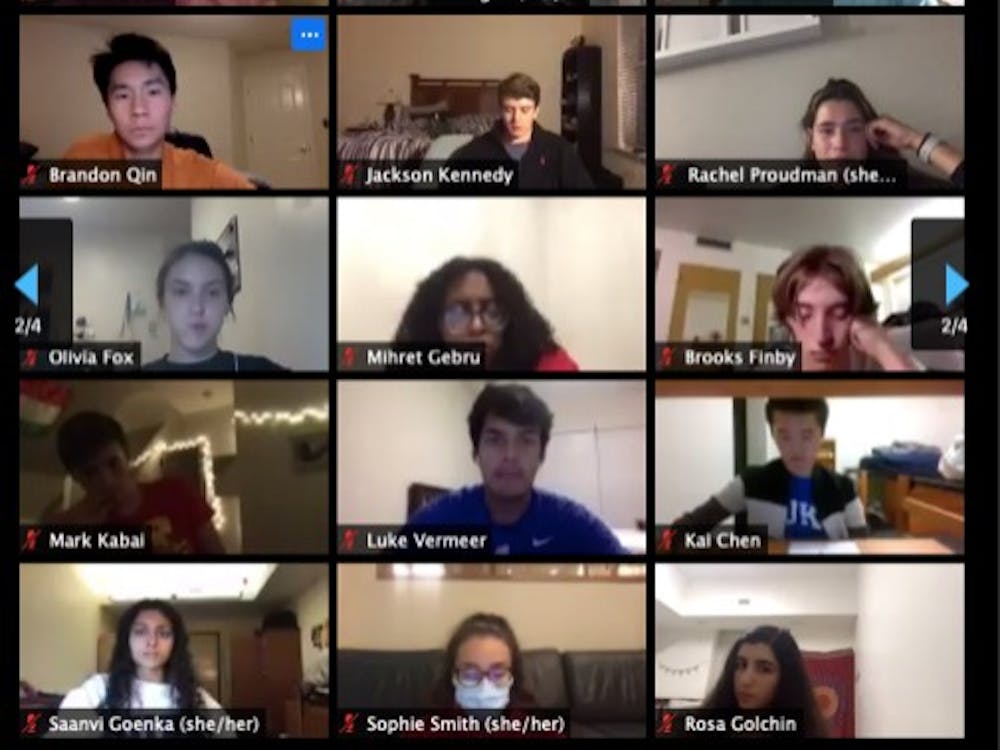Duke Student Government Senators heard from sophomore Drew Flanagan, chair of the Student Organization Finance Committee, at their Wednesday meeting as he discussed a decline in funding to student groups and the current lack of annual budgets due to COVID-19.
As a result of the COVID-19 pandemic, SOFC has not yet released student groups’ annual budgets and is working with University Center Activities and Events to make headway on it next week, according to Flanagan.
Last year’s Senate approved an annual budget totaling $370,000, which would have been distributed in June. Disbursement was put on pause due to budgets being contingent on student enrollment, which varied based on location of residence during the summer, and pay structures, both of which were “moving targets for a long time,” Flanagan said.
Then, the SOFC underwent a “summer overhaul,” moving all their activity—including student group status changes, name changes and funding requests—to DukeGroups and taking over LAUNCH, which was responsible for “filtering of new groups and helping to articulate visions of students on campus,” he said.
Integrating LAUNCH into SOFC, he explained, allows for a more streamlined and controlled process to amplify voices that go unheard or increase partnerships between student groups.
“We are thinking: how do we support groups beyond the financial means?” Flanagan said. “How do we support them administratively?”
Asked by sophomore Hana Hendi, senator for services and sustainability, to elaborate on concrete steps SOFC may take to reach past the financial realm, Flanagan shared that SOFC would begin on Sunday to speak to executive boards of groups the group works closely with to hear their frustrations and questions that are not related to finance.
SOFC is currently reviewing 40 new student group applications, he said, averaging about five groups per week.
This semester, the Cultural Engagement Fund—overseen by the Center for Multicultural Affair and separate from SOFC—is unavailable to student groups, Flanagan said. The CEF provides financial support for student organization programming that promotes “arts, co-curricular education, health and safety, multiculturalism and diversity, University/community service, and/or cross-cultural collaboration,” according to the Student Affairs website.
Junior Aly Diaz, vice president of Durham and regional affairs, asked Flanagan what SOFC’s plans were for responding to the lack of funding and about the likelihood of the establishment of another cultural fund. He said the knowledge of the fund’s unavailability was new to him and that providing a solution would most likely involve all of DSG or Student Affairs.
“Some of that re-frameworking of what it means to support a student group needs to happen, especially now that the CEF is no longer available,” Flanagan said. “But right now, as quickly as we can, we are trying to understand what’s been available in the past to groups, what hasn’t been, and how we can help… The next two weeks are going to be a lot of discovery of what it is we currently don’t know.”
In other business:
Katherine Li, Trinity ’20 and Ubben fellow for student programs at the Duke Alumni Association, spoke to senators about alumni networking and shared two resources that the group offers students: Ask a Blue Devil and the Duke Alumni Network.
Ask a Blue Devil, piloted last spring, is an online platform for students who have a question but may not know who to reach out to. The algorithm, Li explained, will match a student’s request with members of the Duke alumni community based on interests, topics, or city of residence and how active the alum is in responding.
The Duke Alumni Network is a database that allows students to find an alum based on filters such as career, city of residence, major and school, and then send them an email.
Li presented how to use both websites and what a sample first message to an alum could look like, encouraging senators to share these resources with other Duke students.
SOFC and DSG approved recognition for student group Design@Duke, which seeks to create an inclusive design community on campus.
DSG, alongside more than 20 other student groups, will be co-sponsoring the Duke Voter Registration Blowout Oct. 1 from 7-8:30 p.m.
Editor's note: This story has been updated to clarify that the Cultural Engagement Fund is not overseen by SOFC.
Get The Chronicle straight to your inbox
Sign up for our weekly newsletter. Cancel at any time.

Milla Surjadi is a Trinity junior and a diversity, equity and inclusion coordinator of The Chronicle's 119th volume. She was previously editor-in-chief for Volume 118.

